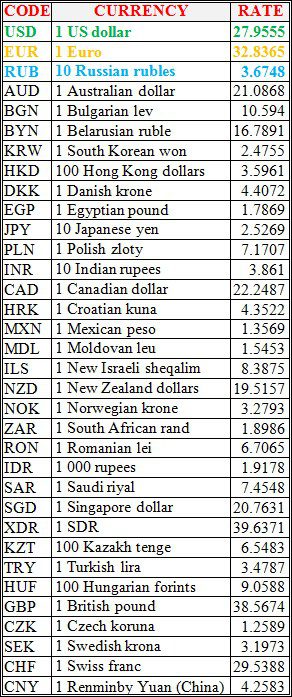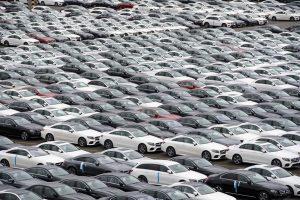National bank of Ukraine’s official rates as of 05/04/21

Source: National Bank of Ukraine

Initial registrations of new commercial vehicles (including heavy trucks) in Ukraine in March doubled compared to the same month of 2020, to 1,155 vehicles, and in general, 2,820 vehicles were registered in January-March, or almost a third more than in the first quarter of last year, according to the Ukrautoprom association.
According to the association’s website, the March result was the best since the beginning of this year – 901 vehicles were registered in January, and 765 new commercial vehicles in February.
At the same time, as reported, in March 2020, the demand for commercial vehicles decreased by 41% compared to March 2019, to 568 vehicles, since after the introduction of quarantine in the country (from March 12) to March 27, service centers of Internal Ministry did not register new commercial vehicles.
According to the report, in March of this year (as well as a year earlier) the best result of the month was demonstrated by French Renault, which increased sales by 17%, to 143 vehicles.
Fiat retained its second place, adding 27% in sales to 136 vehicles. The third place is taken by Peugeot, 119 vehicles and an increase of 2.2 times.
The fourth place, as in March 2020, is taken by Ford, the registrations of vehicles of this brand increased by almost 1.6 times, to 92 vehicles.
Belarusian MAZ closes the top-five in March (in March 2020 it rolled back to the eighth place), and has quadrupled sales to 87 trucks.
Citroen has significantly increased registrations compared to March 2020 (some 2.3 times, to 78 vehicles), MAN (3 times, to 53 vehicles), and Scania (2.5 times, to 42 vehicles).
Chinese brands continue to increase registrations: HOWO – to 31 vehicles versus one in March 2020, JAC – 16 versus four, and Dong Feng – 16 units versus none.
The association also cites statistics on sales of buses (including micro ones) in March, which demonstrates the opposite trend: the sales decreased by 63.3% versus March 2020 and by 11.7% versus February 2021, to 106 buses, primarily due to the reduction of registrations of the leading brand Citroen by 64.4%, to 53 buses.
The second place is taken by Ford (15 buses versus 12 in March 2020), the third by Hyundai (eight buses against four), and the fourth by Ukrainian Etalon (five buses). There are no Ukrainian Bogdan and ZAZ in the rating, and only three of Ataman buses are registered.
Russian brands continue to be registered – PAZ (five units), and UAZ (five units).

President of Ukraine Volodymyr Zelensky has signed a decree on vaccination of the population against coronavirus, providing for the creation of a National Vaccination Plan against COVID-19, according to which the majority of the adult population of Ukraine should receive their vaccinations by the end of this year.
Corresponding document No. 139/2021 “On the decision of the National Security and Defense Council of Ukraine dated April 2, 2021” On the National Plan for Vaccine Preventive Treatment of Acute Respiratory Disease COVID-19 Caused by the SARS-CoV-2 Coronavirus, Until the End of 2021 “was announced on the President’s website on Sunday.
According to the decision of the NSDC, the Cabinet of Ministers of Ukraine within seven days must ensure the development and approval of the National Vaccination Plan against COVID-19, taking into account the best international experience, the press service of the head of state reported.
“In particular, the minimum required monthly number of vaccinations should be established, the sources and timing of the supply of vaccines for the prevention of coronavirus disease, the persons responsible for the implementation of the plan, the ultimate goal of which is to cover the majority of the adult population of Ukraine with vaccinations no later than December 2021 for the formation of herd immunity to the coronavirus,” the President’s Office reported.
They note that the government should intensify negotiations with manufacturers of vaccines against COVID-19, as well as attract international technical assistance for the implementation of the vaccination campaign in Ukraine.
“The Ministry of Health should take urgent and effective measures to supply to Ukraine as soon as possible the required amount of vaccines for the specific prevention of coronavirus disease and ensure public access to vaccination; ensure effective awareness-raising on vaccination,” the message says.
The President’s Office also emphasizes that the decision provides that the Ministry of Foreign Affairs should take urgent measures aimed at increasing the efficiency of cooperation with foreign states and international organizations on the supply of vaccines against COVID-19 to Ukraine.
The decree on the entry into force of the NSDC decision comes into force from the day of its publication.
As reported, Secretary of the National Security and Defense Council Oleksiy Danilov said that in the near future, President of Ukraine Volodymyr Zelensky will sign a decree on the vaccination of the population of Ukraine.
Ukrainian banks’ cash exchange rates on 05/04/21

Source: Interfax-Ukraine

Ukraine and Qatar signed 13 important documents and two commercial contracts on Monday, April 5, Ukrainian President Volodymyr Zelensky said.
“Commend the signing of 13 important documents and 2 commercial contracts between Ukraine & Qatar. Our countries have and realize great potential for deepening cooperation. Grateful to Emir Tamim bin Hamad Al Thani and PM, Minister of Interior Khalid bin Khalifa Al Thani for hospitality,” Zelensky wrote on Twitter